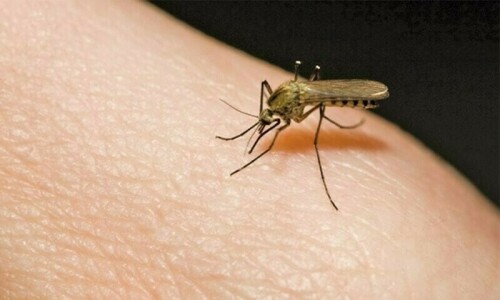PESHAWAR: The Khyber Pakhtunkhwa health department has directed Peshawar’s district health officer to strengthen surveillance and take effective preventive measures against chikungunya after the detection of six cases of the mosquito-borne disease in the provincial capital.
In a letter to Peshawar DHO, director (public health) at the directorate-general (health services) Dr Irshad Roghani noted that a total of 23 suspected chikungunya cases were reported to the Public Health Reference Laboratory at the Khyber Medical University and six of them tested positive for the viral fever.
He said that the confirmed cases, including a woman, belonged to Peshawar, so the district authorities should recognise the severity of the situation and investigative and response measures should be launched for taking effective steps to protect people’s health.
The director said the spread of chikungunya posed serious public health risk, so coordinated work was immediately required to contain the virus.
Health dept orders strengthening of surveillance, investigations
He asked the DHO to submit a comprehensive report regarding investigation, surveillance and response with the health department.
The health department has already deployed three field epidemiologists from the office of directorate general (health services) to collaborate with the teams of the district health management regarding early diagnosis and management of chikungunya cases.
Meanwhile, the health department has formally asked DHOs, public health coordinators and entomologists to take preventive steps against chikungunya, fearing the spread of the viral fever.
In an advisory, the department said that the detection of chikungunya cases were a significant public health concern, so authorities should ensure the prevention and control of the disease.
“In view of the hyperactive season of mosquitoes and previous seasonal trends of chikungunya, it is imperative to undertake preventive measures against it while staying vigilant to pick up suspected cases, confirming the disease, and taking steps to interrupt further transmission.”
Director (public health) Dr Irshad Roghani said that the advisory was meant to sensitise health authorities to further strengthen and improve the level of preparedness for prevention and control of chikungunya, which carried some clinical signs identical with dengue and could be misdiagnosed in areas where dengue was common, but it was rarely fatal without any significant hemorrhagic manifestations.
He said that the proximity of mosquito breeding sites to human habitation was a significant risk factor and the viruses could circulate in the same area with dengue and cause occasional co-infections in the same patient.
“Samples from the suspected chikungunya cases will continue to be sent to PHRL for testing,” he said.
The director said physicians in hospitals had been informed that the disease was characterised by a sudden onset of fever, chills, headache, myalgia, nausea, photophobia, incapacitating joint pain and petechial or maculopapular rash.
He said that once a person had recovered from the disease, he or she is likely to have a lifelong immunity against subsequent chikungunya virus infections while risk factors for more severe disease include in the last weeks of pregnancy for the neonates exposed intra-partum, while the older and those co-morbidity can experience rheumatoid arthritis syndrome.
“There is no specific treatment for the infectious disease, with the doctors mainly relying on the management of symptoms. Neither any vaccine nor any antiviral is available for prevention and treatment of chikungunya,” he said.
The director said that patients required plenty of rest and fluids to prevent dehydration, while symptomatic treatment is advised preferably with Acetaminophen.
He said suspected or confirmed cases should not to take aspirin and other non-steroidal anti-inflammatory drugs and measures be taken for the elimination of mosquito breeding sites, removal of all open containers with stagnant water in and surrounding houses on a regular basis, and sprinkling of larvicides in water pools.
Published in Dawn, November 28th, 2024
















































